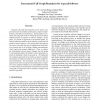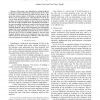555 search results - page 100 / 111 » Polar codes are optimal for lossy source coding |
ADHOCNOW
2004
Springer
14 years 1 months ago
2004
Springer
Recent theoretical results show that it is optimal to allow interfering sources to transmit simultaneously as long as they are outside a well-defined exclusion region around a de...
ICSE
2009
IEEE-ACM
14 years 8 months ago
2009
IEEE-ACM
A variety of compilers, static analyses, and testing frameworks rely heavily on path frequency information. Uses for such information range from optimizing transformations to bug ...
WWW
2006
ACM
14 years 8 months ago
2006
ACM
Wide-area distributed applications are challenging to debug, optimize, and maintain. We present Wide-Area Project 5 (WAP5), which aims to make these tasks easier by exposing the c...
ICSM
2009
IEEE
14 years 2 months ago
2009
IEEE
Program call graph representation can be used to support many tasks in compiler optimization, program comprehension, and software maintenance. During software evolution, the call ...
ICRA
2008
IEEE
14 years 2 months ago
2008
IEEE
— We present a new algorithm for solving the global localization problem called Frozen-Time Smoother (FTS). Time is ‘frozen’, in the sense that the belief always refers to th...


